MGT501 Business Environment: Analysis of IFCO Systems Stakeholders
VerifiedAdded on 2021/08/03
|27
|8647
|205
Report
AI Summary
This report provides a comprehensive analysis of internal and external stakeholders within IFCO Systems, a global provider of reusable packaging solutions. The study identifies functional areas, pinpoints key stakeholders such as owners, managers, employees, customers, distributors, and governments, and assesses their respective interests and levels of influence. It explores the implications of conflicting interests and constructs a stakeholder matrix to visualize relationships. Furthermore, the report compares the grower/retail industry with the tourism industry, highlighting their distinct impacts. The analysis underscores the importance of stakeholder management in sustainable business practices and concludes with insights into the nature of these relationships within IFCO Systems. The report also examines the company's operations, including its RPC management services and the role of various departments like customer service, human resources, and research & development.
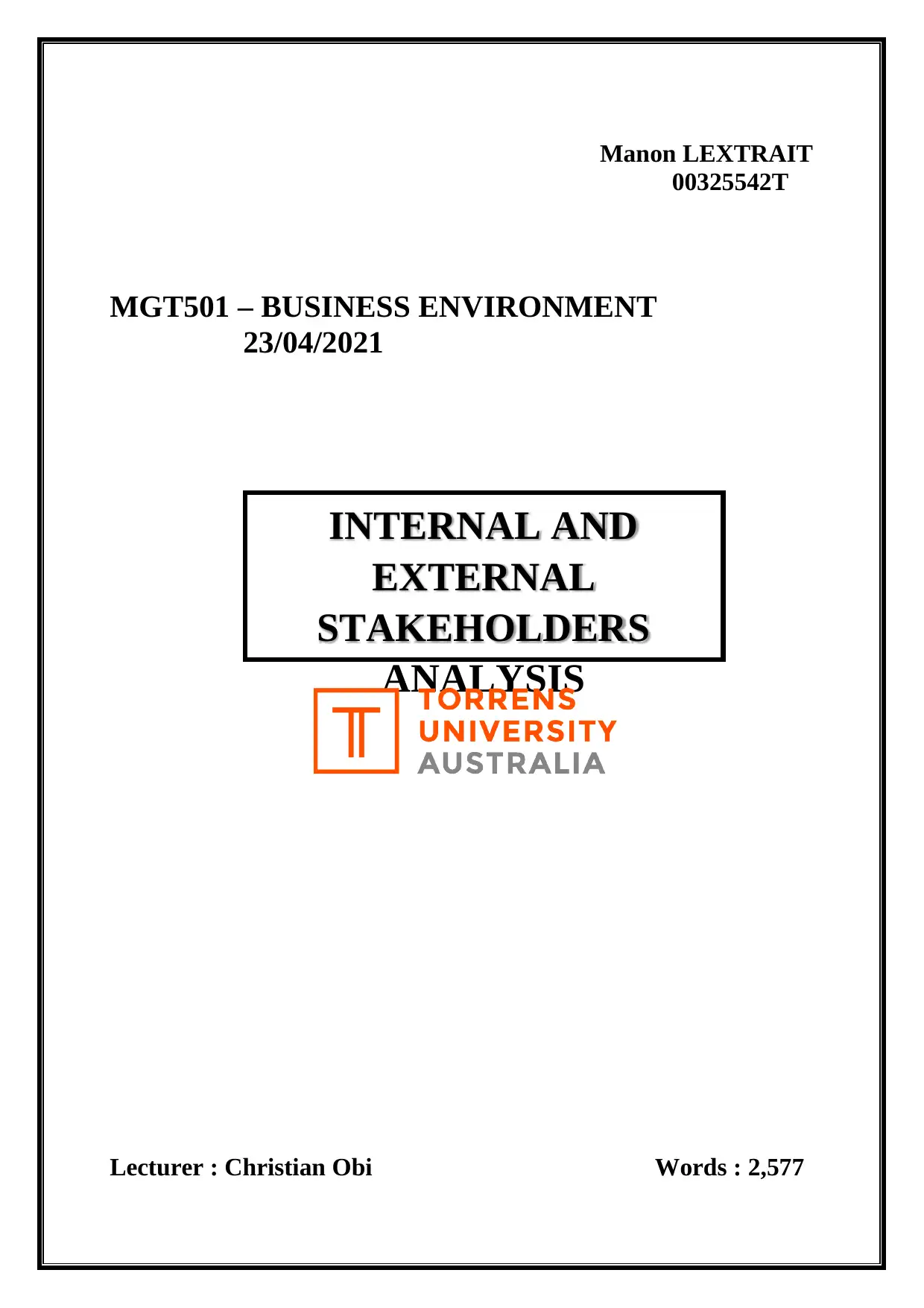
Manon LEXTRAIT
00325542T
MGT501 – BUSINESS ENVIRONMENT
23/04/2021
Lecturer : Christian Obi Words : 2,577
INTERNAL AND
EXTERNAL
STAKEHOLDERS
ANALYSIS
00325542T
MGT501 – BUSINESS ENVIRONMENT
23/04/2021
Lecturer : Christian Obi Words : 2,577
INTERNAL AND
EXTERNAL
STAKEHOLDERS
ANALYSIS
Paraphrase This Document
Need a fresh take? Get an instant paraphrase of this document with our AI Paraphraser
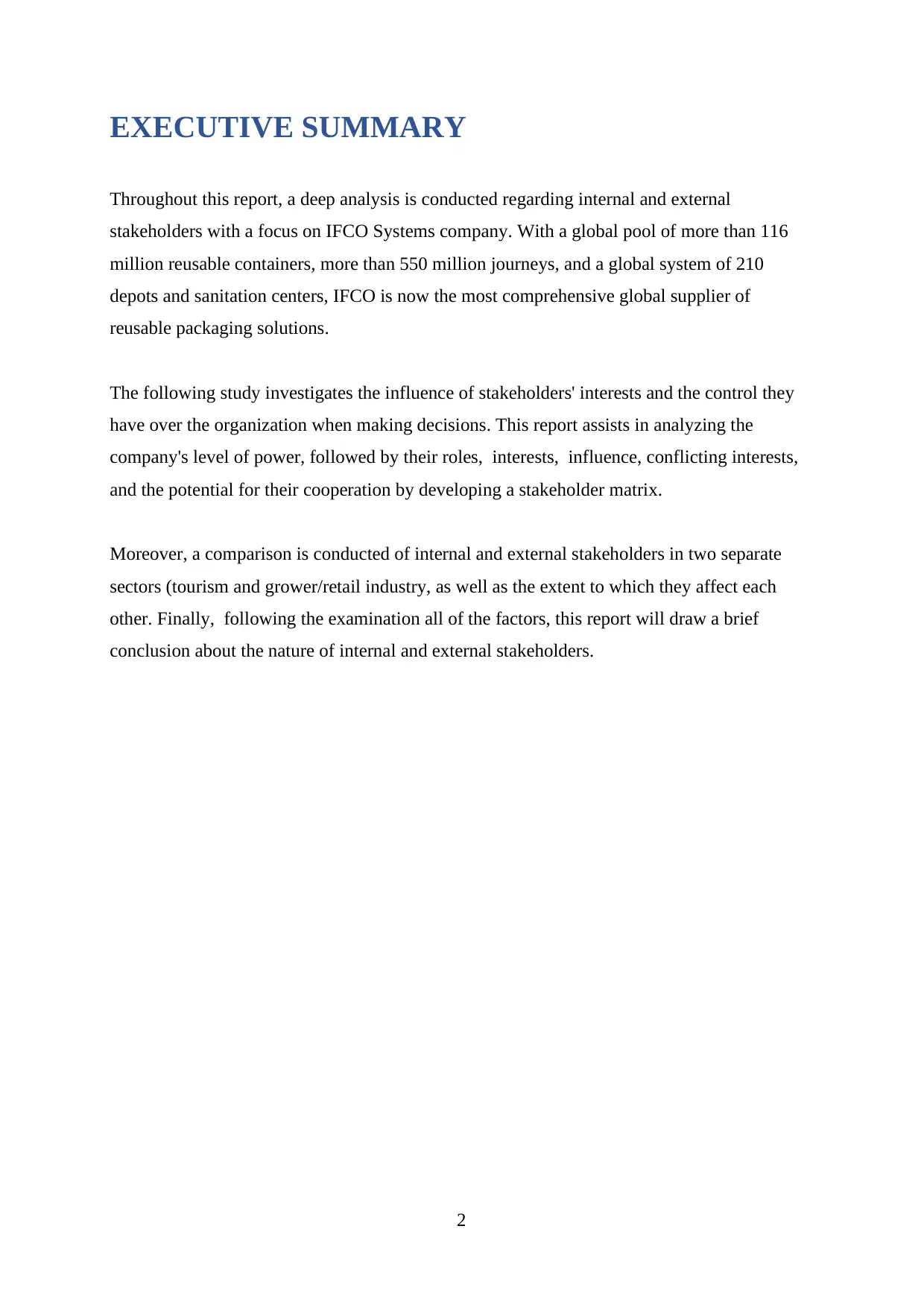
2
EXECUTIVE SUMMARY
Throughout this report, a deep analysis is conducted regarding internal and external
stakeholders with a focus on IFCO Systems company. With a global pool of more than 116
million reusable containers, more than 550 million journeys, and a global system of 210
depots and sanitation centers, IFCO is now the most comprehensive global supplier of
reusable packaging solutions.
The following study investigates the influence of stakeholders' interests and the control they
have over the organization when making decisions. This report assists in analyzing the
company's level of power, followed by their roles, interests, influence, conflicting interests,
and the potential for their cooperation by developing a stakeholder matrix.
Moreover, a comparison is conducted of internal and external stakeholders in two separate
sectors (tourism and grower/retail industry, as well as the extent to which they affect each
other. Finally, following the examination all of the factors, this report will draw a brief
conclusion about the nature of internal and external stakeholders.
EXECUTIVE SUMMARY
Throughout this report, a deep analysis is conducted regarding internal and external
stakeholders with a focus on IFCO Systems company. With a global pool of more than 116
million reusable containers, more than 550 million journeys, and a global system of 210
depots and sanitation centers, IFCO is now the most comprehensive global supplier of
reusable packaging solutions.
The following study investigates the influence of stakeholders' interests and the control they
have over the organization when making decisions. This report assists in analyzing the
company's level of power, followed by their roles, interests, influence, conflicting interests,
and the potential for their cooperation by developing a stakeholder matrix.
Moreover, a comparison is conducted of internal and external stakeholders in two separate
sectors (tourism and grower/retail industry, as well as the extent to which they affect each
other. Finally, following the examination all of the factors, this report will draw a brief
conclusion about the nature of internal and external stakeholders.
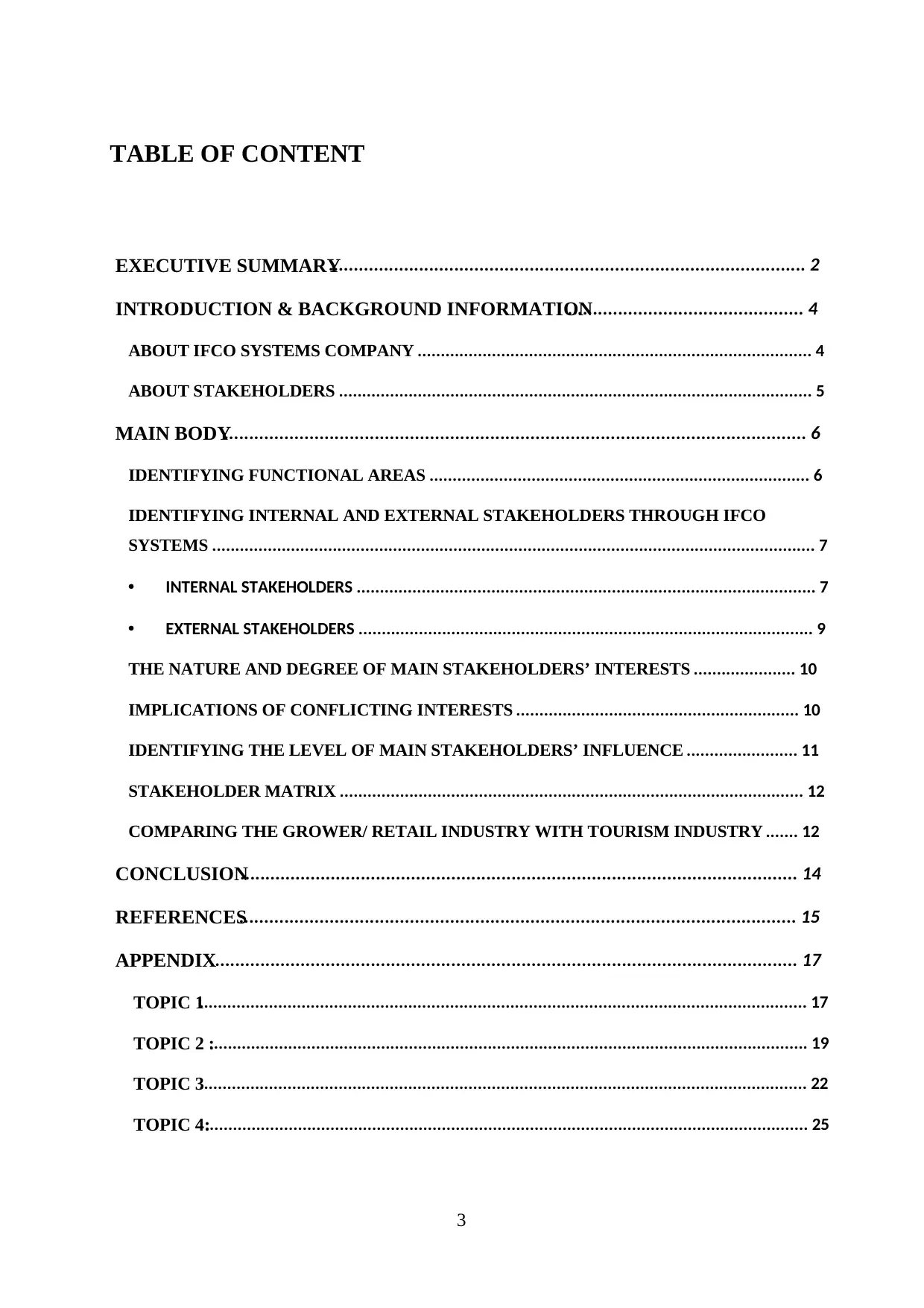
3
TABLE OF CONTENT
EXECUTIVE SUMMARY............................................................................................... 2
INTRODUCTION & BACKGROUND INFORMATION............................................... 4
ABOUT IFCO SYSTEMS COMPANY ..................................................................................... 4
ABOUT STAKEHOLDERS ...................................................................................................... 5
MAIN BODY.................................................................................................................... 6
IDENTIFYING FUNCTIONAL AREAS .................................................................................. 6
IDENTIFYING INTERNAL AND EXTERNAL STAKEHOLDERS THROUGH IFCO
SYSTEMS .................................................................................................................................. 7
• INTERNAL STAKEHOLDERS ................................................................................................... 7
• EXTERNAL STAKEHOLDERS .................................................................................................. 9
THE NATURE AND DEGREE OF MAIN STAKEHOLDERS’ INTERESTS ...................... 10
IMPLICATIONS OF CONFLICTING INTERESTS ............................................................. 10
IDENTIFYING THE LEVEL OF MAIN STAKEHOLDERS’ INFLUENCE ........................ 11
STAKEHOLDER MATRIX .................................................................................................... 12
COMPARING THE GROWER/ RETAIL INDUSTRY WITH TOURISM INDUSTRY ....... 12
CONCLUSION............................................................................................................... 14
REFERENCES............................................................................................................... 15
APPENDIX..................................................................................................................... 17
TOPIC 1................................................................................................................................... 17
TOPIC 2 :................................................................................................................................. 19
TOPIC 3................................................................................................................................... 22
TOPIC 4:.................................................................................................................................. 25
TABLE OF CONTENT
EXECUTIVE SUMMARY............................................................................................... 2
INTRODUCTION & BACKGROUND INFORMATION............................................... 4
ABOUT IFCO SYSTEMS COMPANY ..................................................................................... 4
ABOUT STAKEHOLDERS ...................................................................................................... 5
MAIN BODY.................................................................................................................... 6
IDENTIFYING FUNCTIONAL AREAS .................................................................................. 6
IDENTIFYING INTERNAL AND EXTERNAL STAKEHOLDERS THROUGH IFCO
SYSTEMS .................................................................................................................................. 7
• INTERNAL STAKEHOLDERS ................................................................................................... 7
• EXTERNAL STAKEHOLDERS .................................................................................................. 9
THE NATURE AND DEGREE OF MAIN STAKEHOLDERS’ INTERESTS ...................... 10
IMPLICATIONS OF CONFLICTING INTERESTS ............................................................. 10
IDENTIFYING THE LEVEL OF MAIN STAKEHOLDERS’ INFLUENCE ........................ 11
STAKEHOLDER MATRIX .................................................................................................... 12
COMPARING THE GROWER/ RETAIL INDUSTRY WITH TOURISM INDUSTRY ....... 12
CONCLUSION............................................................................................................... 14
REFERENCES............................................................................................................... 15
APPENDIX..................................................................................................................... 17
TOPIC 1................................................................................................................................... 17
TOPIC 2 :................................................................................................................................. 19
TOPIC 3................................................................................................................................... 22
TOPIC 4:.................................................................................................................................. 25
⊘ This is a preview!⊘
Do you want full access?
Subscribe today to unlock all pages.

Trusted by 1+ million students worldwide
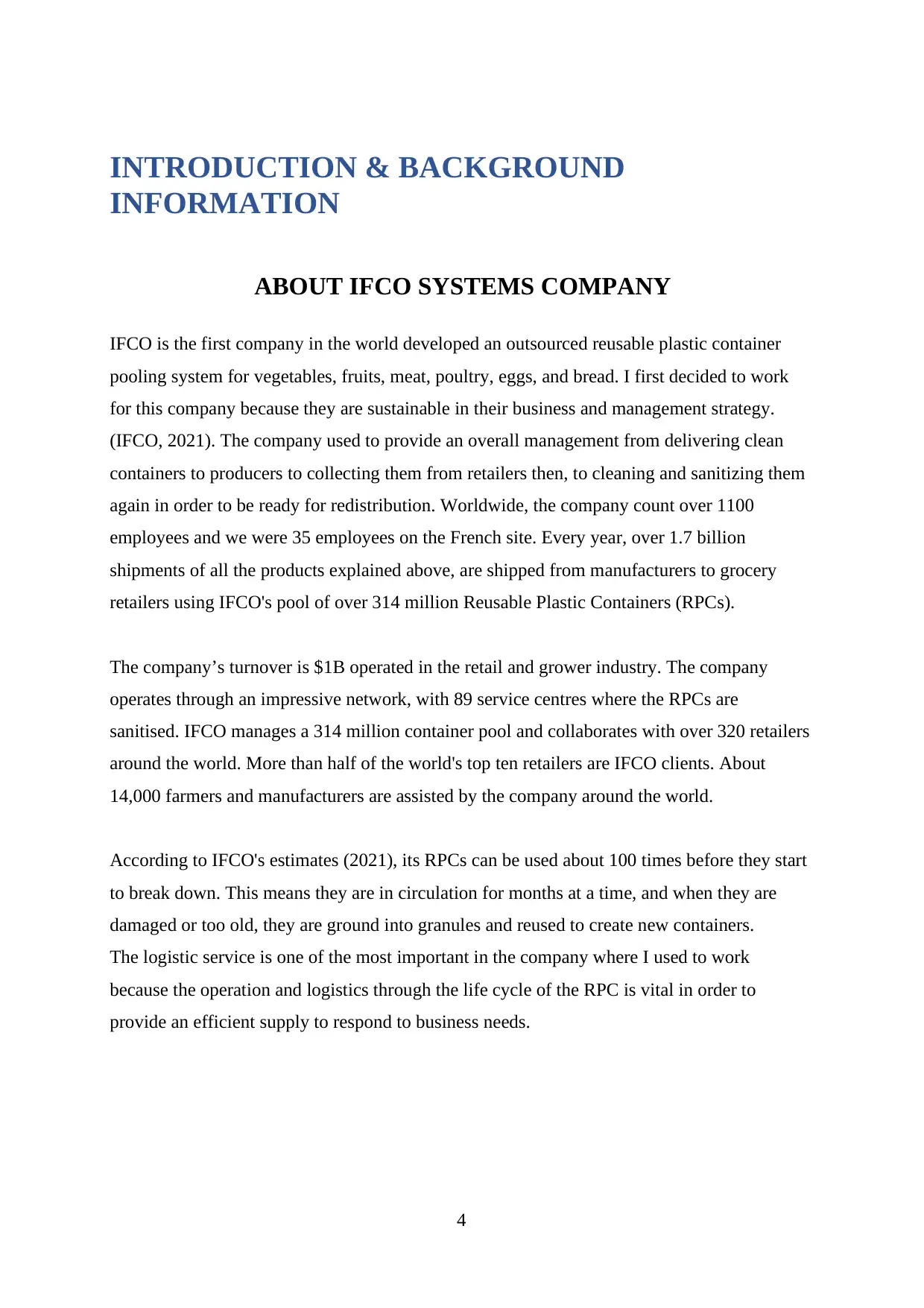
4
INTRODUCTION & BACKGROUND
INFORMATION
ABOUT IFCO SYSTEMS COMPANY
IFCO is the first company in the world developed an outsourced reusable plastic container
pooling system for vegetables, fruits, meat, poultry, eggs, and bread. I first decided to work
for this company because they are sustainable in their business and management strategy.
(IFCO, 2021). The company used to provide an overall management from delivering clean
containers to producers to collecting them from retailers then, to cleaning and sanitizing them
again in order to be ready for redistribution. Worldwide, the company count over 1100
employees and we were 35 employees on the French site. Every year, over 1.7 billion
shipments of all the products explained above, are shipped from manufacturers to grocery
retailers using IFCO's pool of over 314 million Reusable Plastic Containers (RPCs).
The company’s turnover is $1B operated in the retail and grower industry. The company
operates through an impressive network, with 89 service centres where the RPCs are
sanitised. IFCO manages a 314 million container pool and collaborates with over 320 retailers
around the world. More than half of the world's top ten retailers are IFCO clients. About
14,000 farmers and manufacturers are assisted by the company around the world.
According to IFCO's estimates (2021), its RPCs can be used about 100 times before they start
to break down. This means they are in circulation for months at a time, and when they are
damaged or too old, they are ground into granules and reused to create new containers.
The logistic service is one of the most important in the company where I used to work
because the operation and logistics through the life cycle of the RPC is vital in order to
provide an efficient supply to respond to business needs.
INTRODUCTION & BACKGROUND
INFORMATION
ABOUT IFCO SYSTEMS COMPANY
IFCO is the first company in the world developed an outsourced reusable plastic container
pooling system for vegetables, fruits, meat, poultry, eggs, and bread. I first decided to work
for this company because they are sustainable in their business and management strategy.
(IFCO, 2021). The company used to provide an overall management from delivering clean
containers to producers to collecting them from retailers then, to cleaning and sanitizing them
again in order to be ready for redistribution. Worldwide, the company count over 1100
employees and we were 35 employees on the French site. Every year, over 1.7 billion
shipments of all the products explained above, are shipped from manufacturers to grocery
retailers using IFCO's pool of over 314 million Reusable Plastic Containers (RPCs).
The company’s turnover is $1B operated in the retail and grower industry. The company
operates through an impressive network, with 89 service centres where the RPCs are
sanitised. IFCO manages a 314 million container pool and collaborates with over 320 retailers
around the world. More than half of the world's top ten retailers are IFCO clients. About
14,000 farmers and manufacturers are assisted by the company around the world.
According to IFCO's estimates (2021), its RPCs can be used about 100 times before they start
to break down. This means they are in circulation for months at a time, and when they are
damaged or too old, they are ground into granules and reused to create new containers.
The logistic service is one of the most important in the company where I used to work
because the operation and logistics through the life cycle of the RPC is vital in order to
provide an efficient supply to respond to business needs.
Paraphrase This Document
Need a fresh take? Get an instant paraphrase of this document with our AI Paraphraser
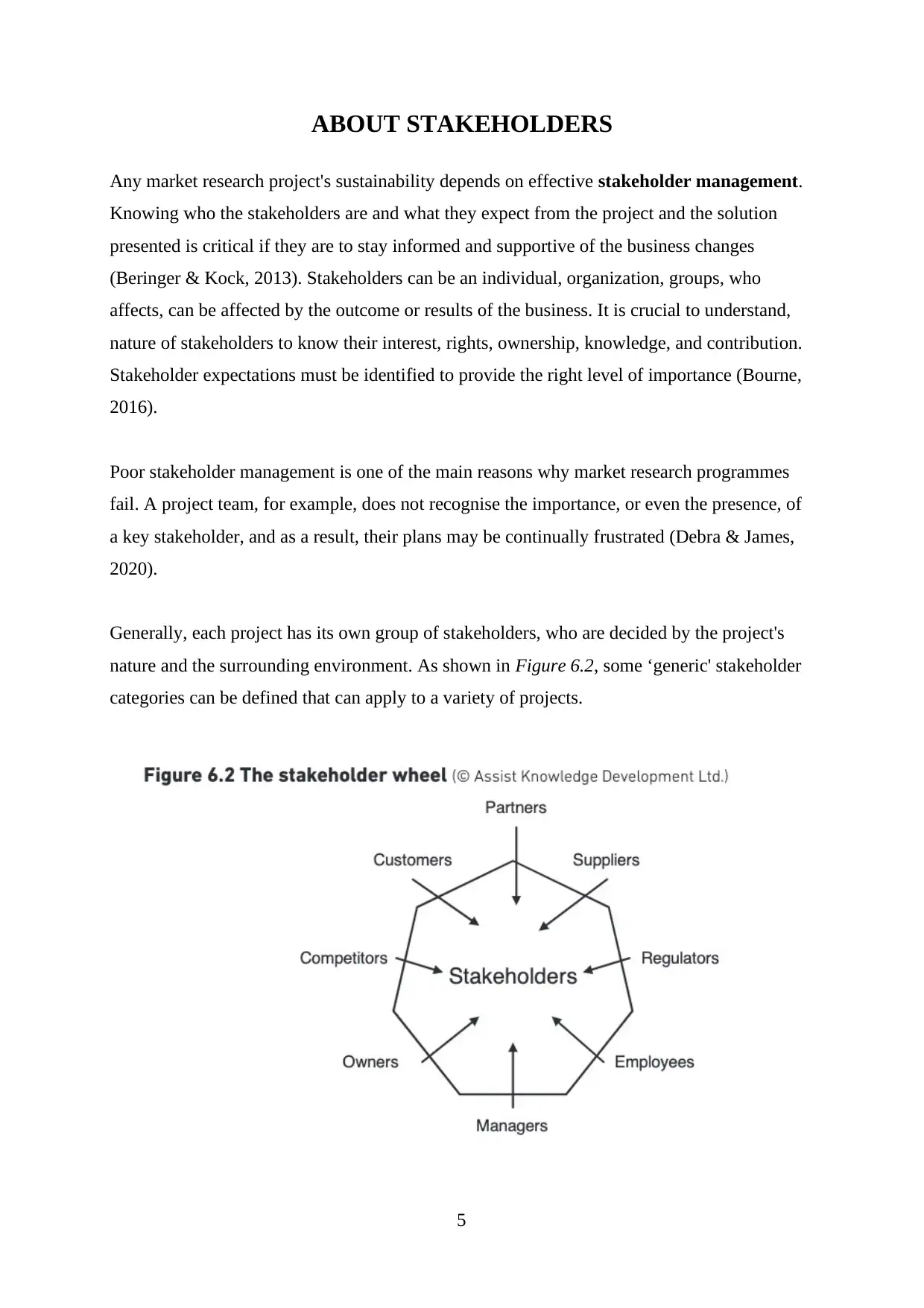
5
ABOUT STAKEHOLDERS
Any market research project's sustainability depends on effective stakeholder management.
Knowing who the stakeholders are and what they expect from the project and the solution
presented is critical if they are to stay informed and supportive of the business changes
(Beringer & Kock, 2013). Stakeholders can be an individual, organization, groups, who
affects, can be affected by the outcome or results of the business. It is crucial to understand,
nature of stakeholders to know their interest, rights, ownership, knowledge, and contribution.
Stakeholder expectations must be identified to provide the right level of importance (Bourne,
2016).
Poor stakeholder management is one of the main reasons why market research programmes
fail. A project team, for example, does not recognise the importance, or even the presence, of
a key stakeholder, and as a result, their plans may be continually frustrated (Debra & James,
2020).
Generally, each project has its own group of stakeholders, who are decided by the project's
nature and the surrounding environment. As shown in Figure 6.2, some ‘generic' stakeholder
categories can be defined that can apply to a variety of projects.
ABOUT STAKEHOLDERS
Any market research project's sustainability depends on effective stakeholder management.
Knowing who the stakeholders are and what they expect from the project and the solution
presented is critical if they are to stay informed and supportive of the business changes
(Beringer & Kock, 2013). Stakeholders can be an individual, organization, groups, who
affects, can be affected by the outcome or results of the business. It is crucial to understand,
nature of stakeholders to know their interest, rights, ownership, knowledge, and contribution.
Stakeholder expectations must be identified to provide the right level of importance (Bourne,
2016).
Poor stakeholder management is one of the main reasons why market research programmes
fail. A project team, for example, does not recognise the importance, or even the presence, of
a key stakeholder, and as a result, their plans may be continually frustrated (Debra & James,
2020).
Generally, each project has its own group of stakeholders, who are decided by the project's
nature and the surrounding environment. As shown in Figure 6.2, some ‘generic' stakeholder
categories can be defined that can apply to a variety of projects.
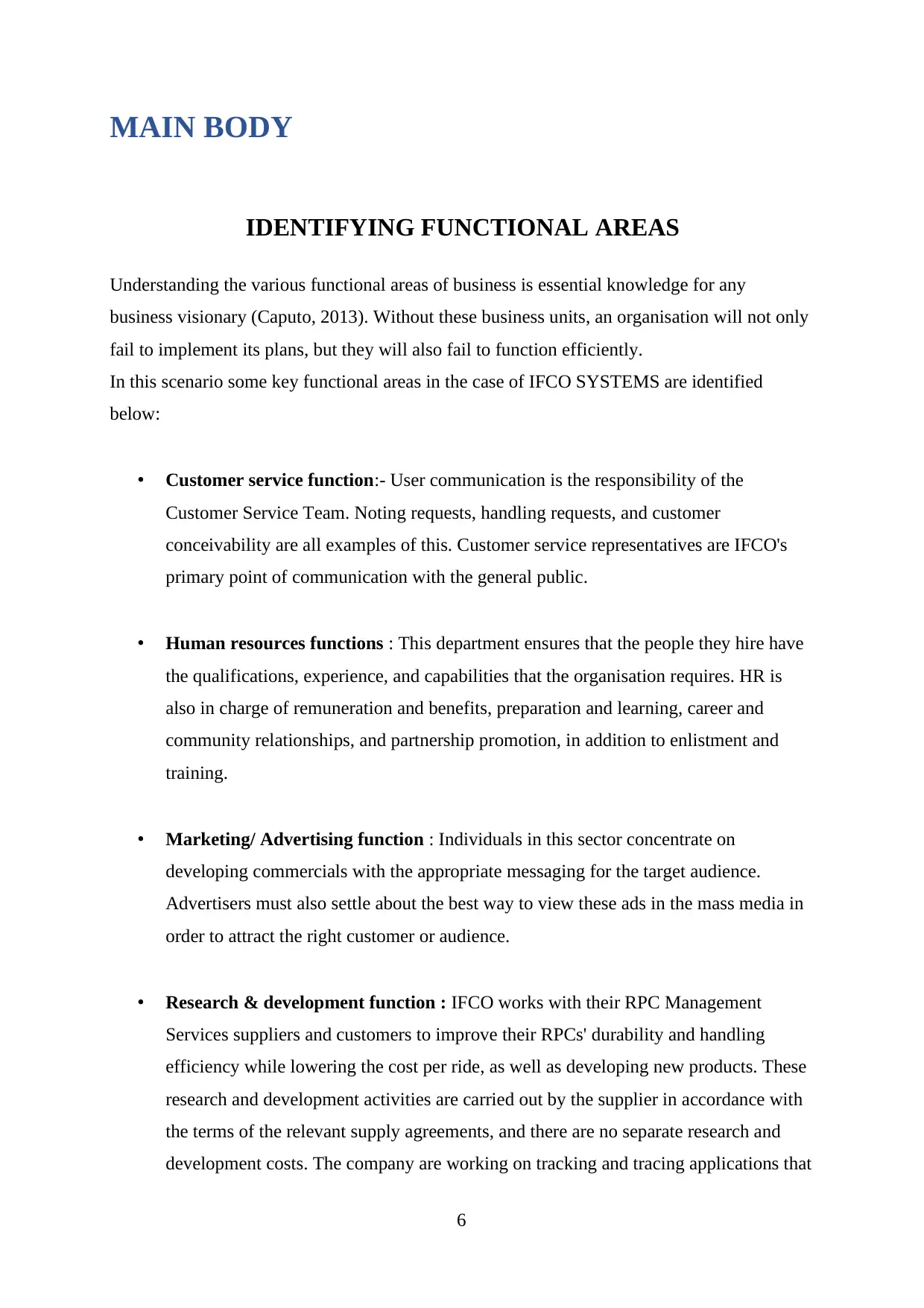
6
MAIN BODY
IDENTIFYING FUNCTIONAL AREAS
Understanding the various functional areas of business is essential knowledge for any
business visionary (Caputo, 2013). Without these business units, an organisation will not only
fail to implement its plans, but they will also fail to function efficiently.
In this scenario some key functional areas in the case of IFCO SYSTEMS are identified
below:
• Customer service function:- User communication is the responsibility of the
Customer Service Team. Noting requests, handling requests, and customer
conceivability are all examples of this. Customer service representatives are IFCO's
primary point of communication with the general public.
• Human resources functions : This department ensures that the people they hire have
the qualifications, experience, and capabilities that the organisation requires. HR is
also in charge of remuneration and benefits, preparation and learning, career and
community relationships, and partnership promotion, in addition to enlistment and
training.
• Marketing/ Advertising function : Individuals in this sector concentrate on
developing commercials with the appropriate messaging for the target audience.
Advertisers must also settle about the best way to view these ads in the mass media in
order to attract the right customer or audience.
• Research & development function : IFCO works with their RPC Management
Services suppliers and customers to improve their RPCs' durability and handling
efficiency while lowering the cost per ride, as well as developing new products. These
research and development activities are carried out by the supplier in accordance with
the terms of the relevant supply agreements, and there are no separate research and
development costs. The company are working on tracking and tracing applications that
MAIN BODY
IDENTIFYING FUNCTIONAL AREAS
Understanding the various functional areas of business is essential knowledge for any
business visionary (Caputo, 2013). Without these business units, an organisation will not only
fail to implement its plans, but they will also fail to function efficiently.
In this scenario some key functional areas in the case of IFCO SYSTEMS are identified
below:
• Customer service function:- User communication is the responsibility of the
Customer Service Team. Noting requests, handling requests, and customer
conceivability are all examples of this. Customer service representatives are IFCO's
primary point of communication with the general public.
• Human resources functions : This department ensures that the people they hire have
the qualifications, experience, and capabilities that the organisation requires. HR is
also in charge of remuneration and benefits, preparation and learning, career and
community relationships, and partnership promotion, in addition to enlistment and
training.
• Marketing/ Advertising function : Individuals in this sector concentrate on
developing commercials with the appropriate messaging for the target audience.
Advertisers must also settle about the best way to view these ads in the mass media in
order to attract the right customer or audience.
• Research & development function : IFCO works with their RPC Management
Services suppliers and customers to improve their RPCs' durability and handling
efficiency while lowering the cost per ride, as well as developing new products. These
research and development activities are carried out by the supplier in accordance with
the terms of the relevant supply agreements, and there are no separate research and
development costs. The company are working on tracking and tracing applications that
⊘ This is a preview!⊘
Do you want full access?
Subscribe today to unlock all pages.

Trusted by 1+ million students worldwide
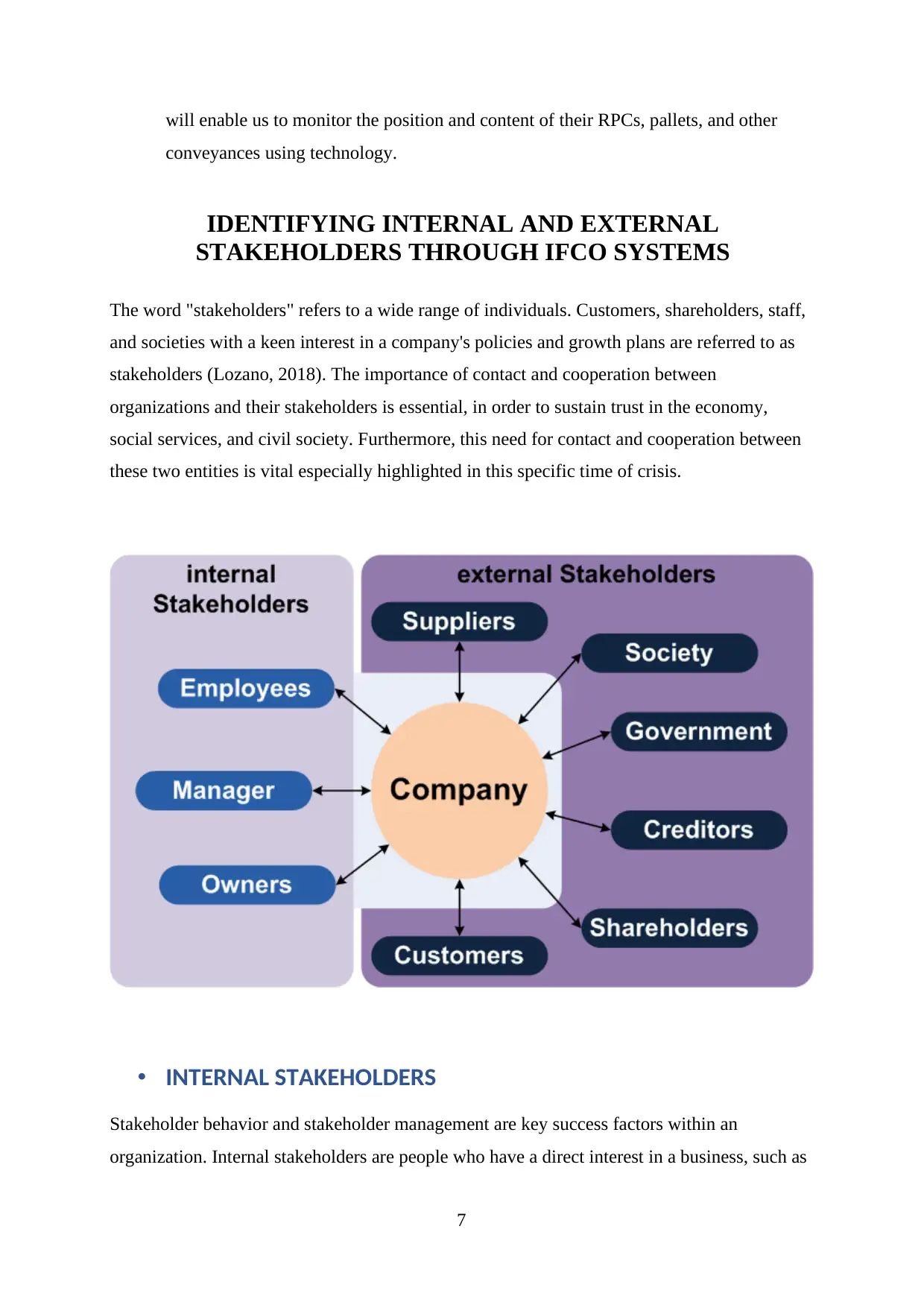
7
will enable us to monitor the position and content of their RPCs, pallets, and other
conveyances using technology.
IDENTIFYING INTERNAL AND EXTERNAL
STAKEHOLDERS THROUGH IFCO SYSTEMS
The word "stakeholders" refers to a wide range of individuals. Customers, shareholders, staff,
and societies with a keen interest in a company's policies and growth plans are referred to as
stakeholders (Lozano, 2018). The importance of contact and cooperation between
organizations and their stakeholders is essential, in order to sustain trust in the economy,
social services, and civil society. Furthermore, this need for contact and cooperation between
these two entities is vital especially highlighted in this specific time of crisis.
• INTERNAL STAKEHOLDERS
Stakeholder behavior and stakeholder management are key success factors within an
organization. Internal stakeholders are people who have a direct interest in a business, such as
will enable us to monitor the position and content of their RPCs, pallets, and other
conveyances using technology.
IDENTIFYING INTERNAL AND EXTERNAL
STAKEHOLDERS THROUGH IFCO SYSTEMS
The word "stakeholders" refers to a wide range of individuals. Customers, shareholders, staff,
and societies with a keen interest in a company's policies and growth plans are referred to as
stakeholders (Lozano, 2018). The importance of contact and cooperation between
organizations and their stakeholders is essential, in order to sustain trust in the economy,
social services, and civil society. Furthermore, this need for contact and cooperation between
these two entities is vital especially highlighted in this specific time of crisis.
• INTERNAL STAKEHOLDERS
Stakeholder behavior and stakeholder management are key success factors within an
organization. Internal stakeholders are people who have a direct interest in a business, such as
Paraphrase This Document
Need a fresh take? Get an instant paraphrase of this document with our AI Paraphraser
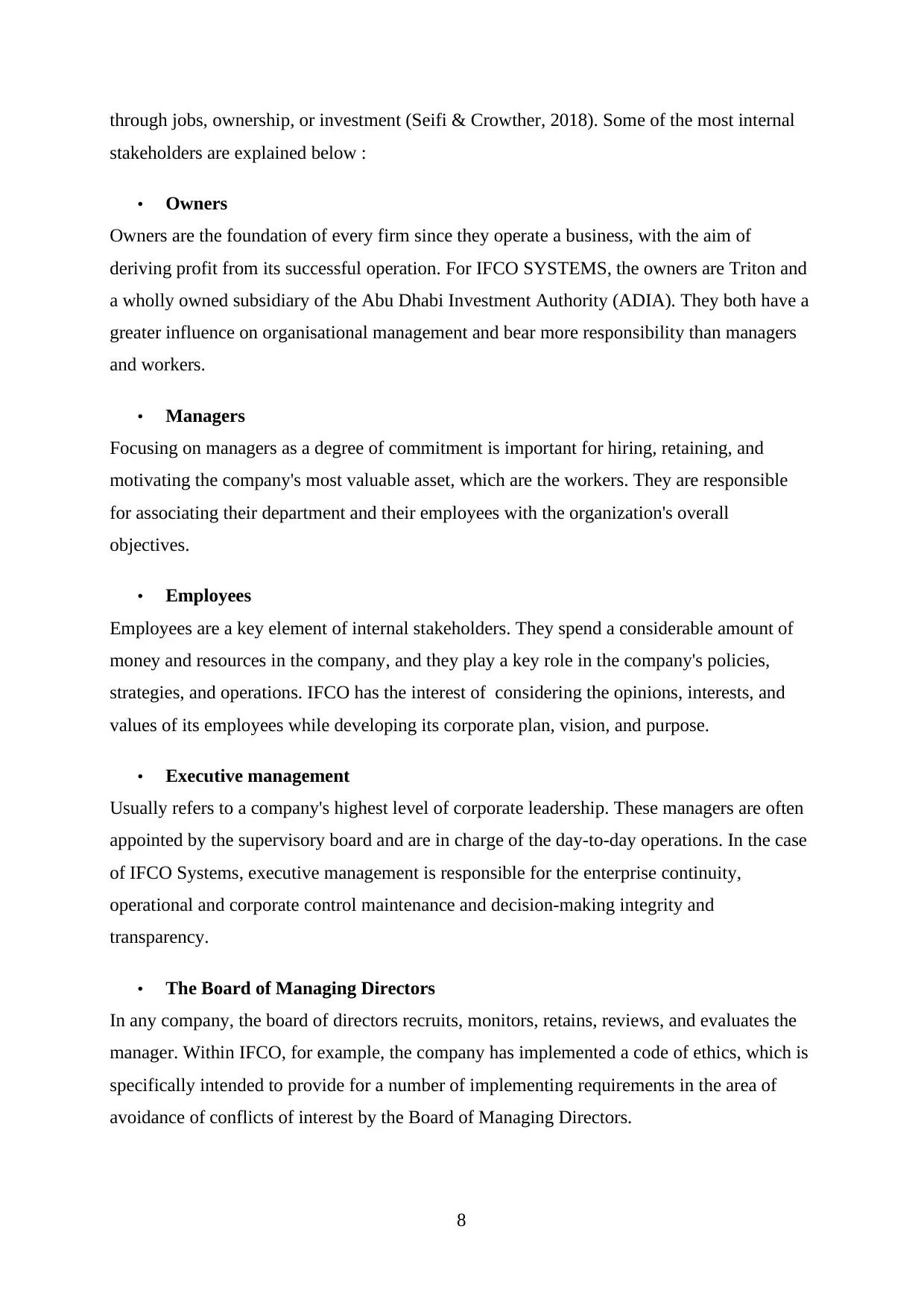
8
through jobs, ownership, or investment (Seifi & Crowther, 2018). Some of the most internal
stakeholders are explained below :
• Owners
Owners are the foundation of every firm since they operate a business, with the aim of
deriving profit from its successful operation. For IFCO SYSTEMS, the owners are Triton and
a wholly owned subsidiary of the Abu Dhabi Investment Authority (ADIA). They both have a
greater influence on organisational management and bear more responsibility than managers
and workers.
• Managers
Focusing on managers as a degree of commitment is important for hiring, retaining, and
motivating the company's most valuable asset, which are the workers. They are responsible
for associating their department and their employees with the organization's overall
objectives.
• Employees
Employees are a key element of internal stakeholders. They spend a considerable amount of
money and resources in the company, and they play a key role in the company's policies,
strategies, and operations. IFCO has the interest of considering the opinions, interests, and
values of its employees while developing its corporate plan, vision, and purpose.
• Executive management
Usually refers to a company's highest level of corporate leadership. These managers are often
appointed by the supervisory board and are in charge of the day-to-day operations. In the case
of IFCO Systems, executive management is responsible for the enterprise continuity,
operational and corporate control maintenance and decision-making integrity and
transparency.
• The Board of Managing Directors
In any company, the board of directors recruits, monitors, retains, reviews, and evaluates the
manager. Within IFCO, for example, the company has implemented a code of ethics, which is
specifically intended to provide for a number of implementing requirements in the area of
avoidance of conflicts of interest by the Board of Managing Directors.
through jobs, ownership, or investment (Seifi & Crowther, 2018). Some of the most internal
stakeholders are explained below :
• Owners
Owners are the foundation of every firm since they operate a business, with the aim of
deriving profit from its successful operation. For IFCO SYSTEMS, the owners are Triton and
a wholly owned subsidiary of the Abu Dhabi Investment Authority (ADIA). They both have a
greater influence on organisational management and bear more responsibility than managers
and workers.
• Managers
Focusing on managers as a degree of commitment is important for hiring, retaining, and
motivating the company's most valuable asset, which are the workers. They are responsible
for associating their department and their employees with the organization's overall
objectives.
• Employees
Employees are a key element of internal stakeholders. They spend a considerable amount of
money and resources in the company, and they play a key role in the company's policies,
strategies, and operations. IFCO has the interest of considering the opinions, interests, and
values of its employees while developing its corporate plan, vision, and purpose.
• Executive management
Usually refers to a company's highest level of corporate leadership. These managers are often
appointed by the supervisory board and are in charge of the day-to-day operations. In the case
of IFCO Systems, executive management is responsible for the enterprise continuity,
operational and corporate control maintenance and decision-making integrity and
transparency.
• The Board of Managing Directors
In any company, the board of directors recruits, monitors, retains, reviews, and evaluates the
manager. Within IFCO, for example, the company has implemented a code of ethics, which is
specifically intended to provide for a number of implementing requirements in the area of
avoidance of conflicts of interest by the Board of Managing Directors.
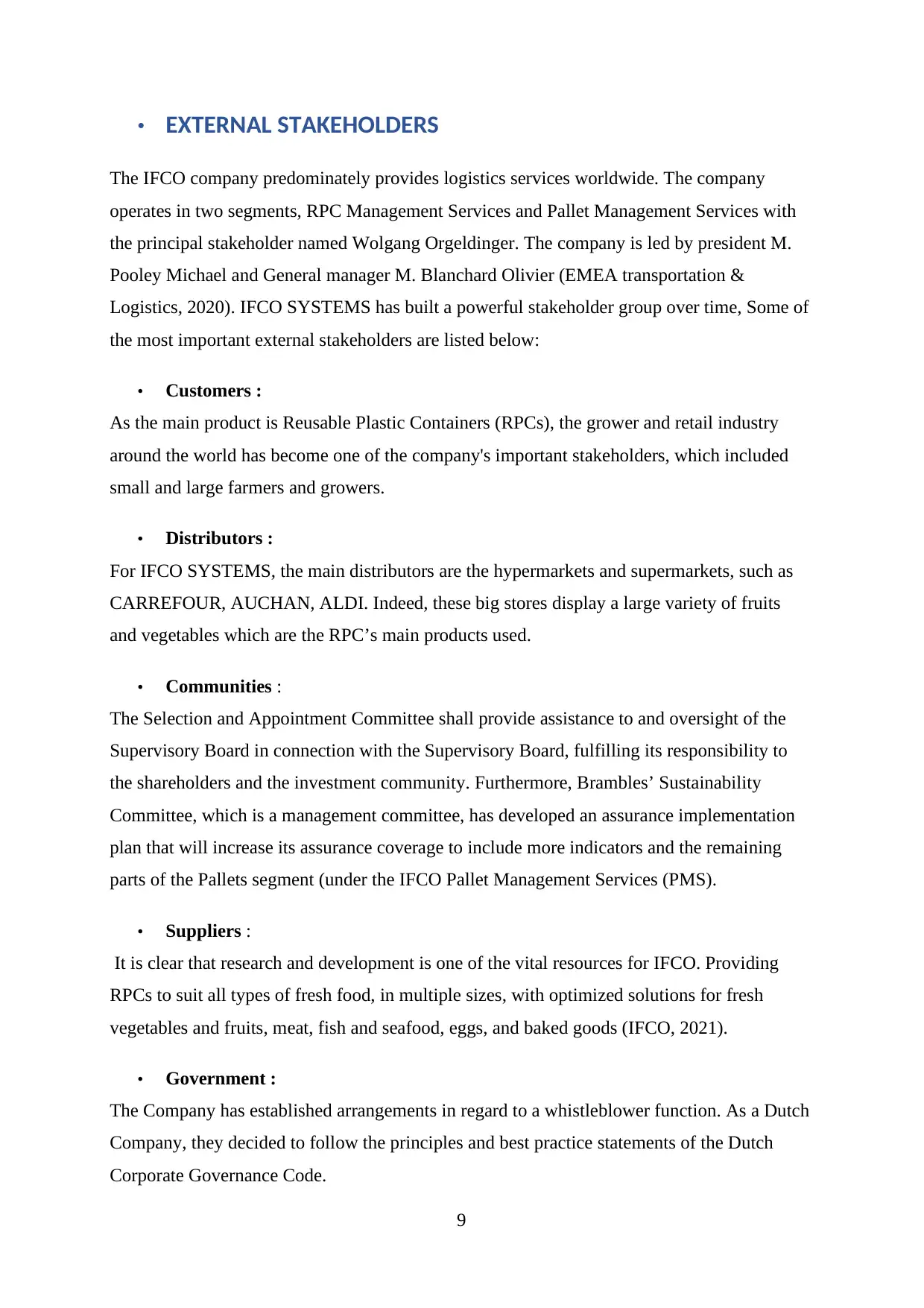
9
• EXTERNAL STAKEHOLDERS
The IFCO company predominately provides logistics services worldwide. The company
operates in two segments, RPC Management Services and Pallet Management Services with
the principal stakeholder named Wolgang Orgeldinger. The company is led by president M.
Pooley Michael and General manager M. Blanchard Olivier (EMEA transportation &
Logistics, 2020). IFCO SYSTEMS has built a powerful stakeholder group over time, Some of
the most important external stakeholders are listed below:
• Customers :
As the main product is Reusable Plastic Containers (RPCs), the grower and retail industry
around the world has become one of the company's important stakeholders, which included
small and large farmers and growers.
• Distributors :
For IFCO SYSTEMS, the main distributors are the hypermarkets and supermarkets, such as
CARREFOUR, AUCHAN, ALDI. Indeed, these big stores display a large variety of fruits
and vegetables which are the RPC’s main products used.
• Communities :
The Selection and Appointment Committee shall provide assistance to and oversight of the
Supervisory Board in connection with the Supervisory Board, fulfilling its responsibility to
the shareholders and the investment community. Furthermore, Brambles’ Sustainability
Committee, which is a management committee, has developed an assurance implementation
plan that will increase its assurance coverage to include more indicators and the remaining
parts of the Pallets segment (under the IFCO Pallet Management Services (PMS).
• Suppliers :
It is clear that research and development is one of the vital resources for IFCO. Providing
RPCs to suit all types of fresh food, in multiple sizes, with optimized solutions for fresh
vegetables and fruits, meat, fish and seafood, eggs, and baked goods (IFCO, 2021).
• Government :
The Company has established arrangements in regard to a whistleblower function. As a Dutch
Company, they decided to follow the principles and best practice statements of the Dutch
Corporate Governance Code.
• EXTERNAL STAKEHOLDERS
The IFCO company predominately provides logistics services worldwide. The company
operates in two segments, RPC Management Services and Pallet Management Services with
the principal stakeholder named Wolgang Orgeldinger. The company is led by president M.
Pooley Michael and General manager M. Blanchard Olivier (EMEA transportation &
Logistics, 2020). IFCO SYSTEMS has built a powerful stakeholder group over time, Some of
the most important external stakeholders are listed below:
• Customers :
As the main product is Reusable Plastic Containers (RPCs), the grower and retail industry
around the world has become one of the company's important stakeholders, which included
small and large farmers and growers.
• Distributors :
For IFCO SYSTEMS, the main distributors are the hypermarkets and supermarkets, such as
CARREFOUR, AUCHAN, ALDI. Indeed, these big stores display a large variety of fruits
and vegetables which are the RPC’s main products used.
• Communities :
The Selection and Appointment Committee shall provide assistance to and oversight of the
Supervisory Board in connection with the Supervisory Board, fulfilling its responsibility to
the shareholders and the investment community. Furthermore, Brambles’ Sustainability
Committee, which is a management committee, has developed an assurance implementation
plan that will increase its assurance coverage to include more indicators and the remaining
parts of the Pallets segment (under the IFCO Pallet Management Services (PMS).
• Suppliers :
It is clear that research and development is one of the vital resources for IFCO. Providing
RPCs to suit all types of fresh food, in multiple sizes, with optimized solutions for fresh
vegetables and fruits, meat, fish and seafood, eggs, and baked goods (IFCO, 2021).
• Government :
The Company has established arrangements in regard to a whistleblower function. As a Dutch
Company, they decided to follow the principles and best practice statements of the Dutch
Corporate Governance Code.
⊘ This is a preview!⊘
Do you want full access?
Subscribe today to unlock all pages.

Trusted by 1+ million students worldwide
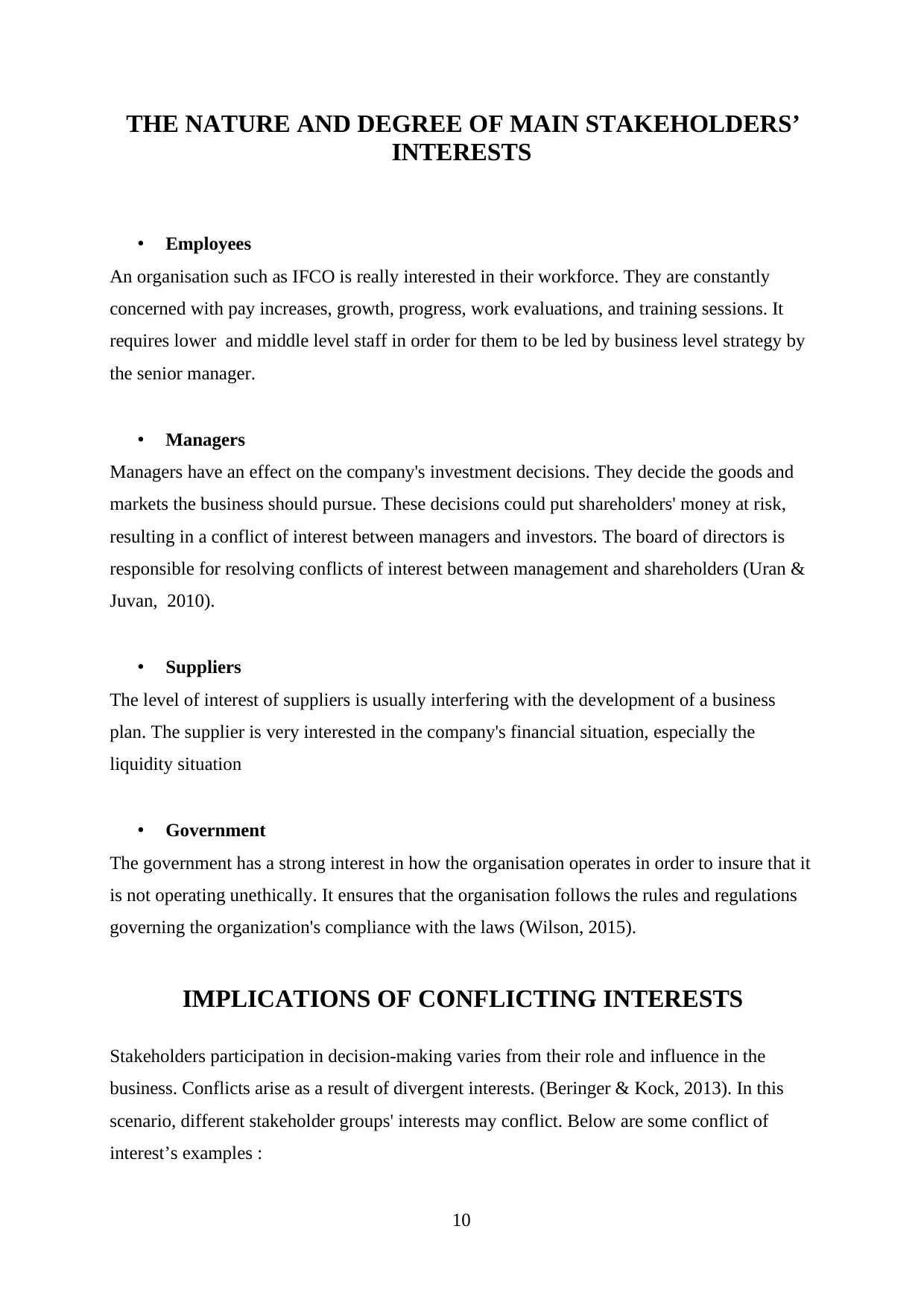
10
THE NATURE AND DEGREE OF MAIN STAKEHOLDERS’
INTERESTS
• Employees
An organisation such as IFCO is really interested in their workforce. They are constantly
concerned with pay increases, growth, progress, work evaluations, and training sessions. It
requires lower and middle level staff in order for them to be led by business level strategy by
the senior manager.
• Managers
Managers have an effect on the company's investment decisions. They decide the goods and
markets the business should pursue. These decisions could put shareholders' money at risk,
resulting in a conflict of interest between managers and investors. The board of directors is
responsible for resolving conflicts of interest between management and shareholders (Uran &
Juvan, 2010).
• Suppliers
The level of interest of suppliers is usually interfering with the development of a business
plan. The supplier is very interested in the company's financial situation, especially the
liquidity situation
• Government
The government has a strong interest in how the organisation operates in order to insure that it
is not operating unethically. It ensures that the organisation follows the rules and regulations
governing the organization's compliance with the laws (Wilson, 2015).
IMPLICATIONS OF CONFLICTING INTERESTS
Stakeholders participation in decision-making varies from their role and influence in the
business. Conflicts arise as a result of divergent interests. (Beringer & Kock, 2013). In this
scenario, different stakeholder groups' interests may conflict. Below are some conflict of
interest’s examples :
THE NATURE AND DEGREE OF MAIN STAKEHOLDERS’
INTERESTS
• Employees
An organisation such as IFCO is really interested in their workforce. They are constantly
concerned with pay increases, growth, progress, work evaluations, and training sessions. It
requires lower and middle level staff in order for them to be led by business level strategy by
the senior manager.
• Managers
Managers have an effect on the company's investment decisions. They decide the goods and
markets the business should pursue. These decisions could put shareholders' money at risk,
resulting in a conflict of interest between managers and investors. The board of directors is
responsible for resolving conflicts of interest between management and shareholders (Uran &
Juvan, 2010).
• Suppliers
The level of interest of suppliers is usually interfering with the development of a business
plan. The supplier is very interested in the company's financial situation, especially the
liquidity situation
• Government
The government has a strong interest in how the organisation operates in order to insure that it
is not operating unethically. It ensures that the organisation follows the rules and regulations
governing the organization's compliance with the laws (Wilson, 2015).
IMPLICATIONS OF CONFLICTING INTERESTS
Stakeholders participation in decision-making varies from their role and influence in the
business. Conflicts arise as a result of divergent interests. (Beringer & Kock, 2013). In this
scenario, different stakeholder groups' interests may conflict. Below are some conflict of
interest’s examples :
Paraphrase This Document
Need a fresh take? Get an instant paraphrase of this document with our AI Paraphraser
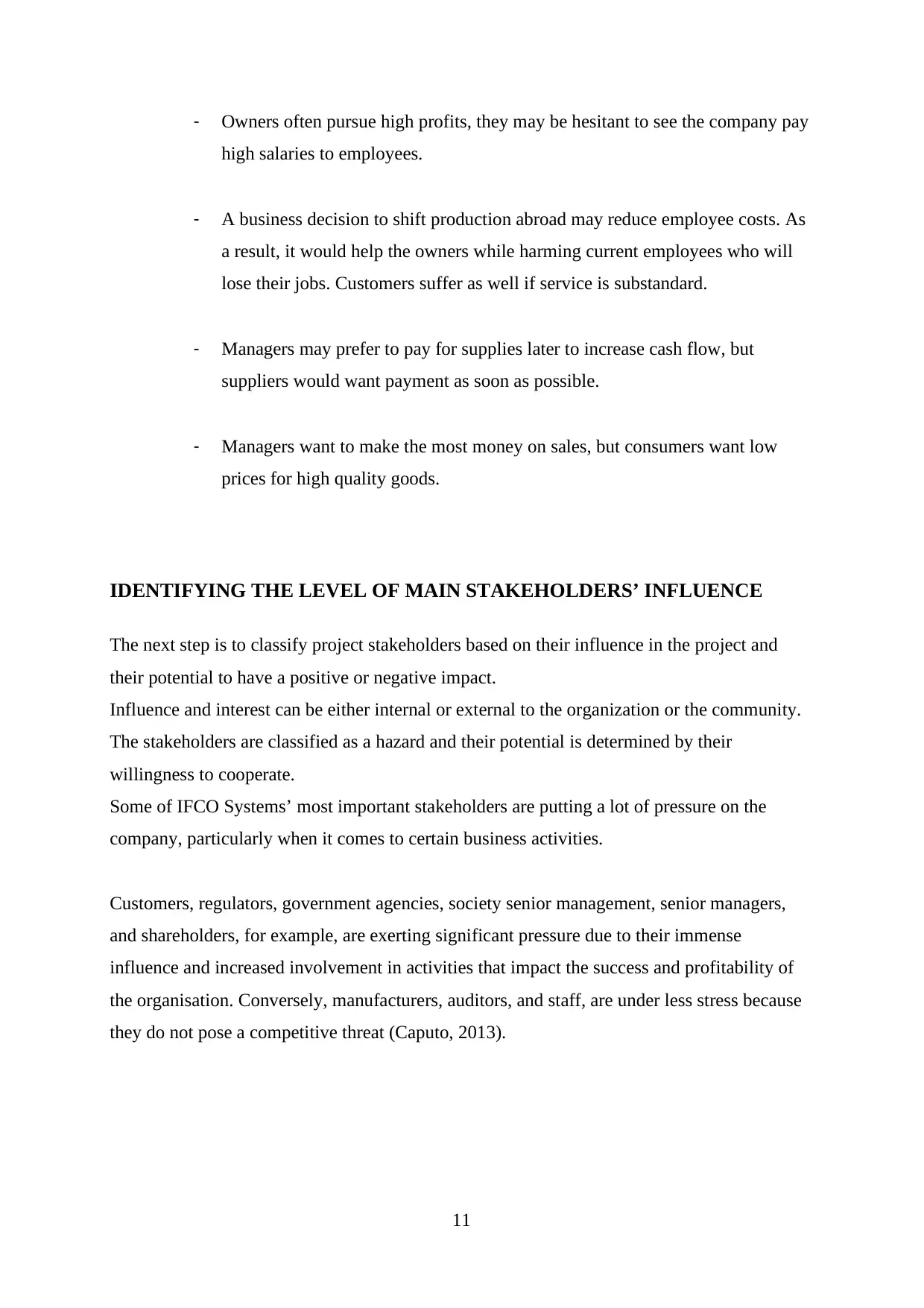
11
- Owners often pursue high profits, they may be hesitant to see the company pay
high salaries to employees.
- A business decision to shift production abroad may reduce employee costs. As
a result, it would help the owners while harming current employees who will
lose their jobs. Customers suffer as well if service is substandard.
- Managers may prefer to pay for supplies later to increase cash flow, but
suppliers would want payment as soon as possible.
- Managers want to make the most money on sales, but consumers want low
prices for high quality goods.
IDENTIFYING THE LEVEL OF MAIN STAKEHOLDERS’ INFLUENCE
The next step is to classify project stakeholders based on their influence in the project and
their potential to have a positive or negative impact.
Influence and interest can be either internal or external to the organization or the community.
The stakeholders are classified as a hazard and their potential is determined by their
willingness to cooperate.
Some of IFCO Systems’ most important stakeholders are putting a lot of pressure on the
company, particularly when it comes to certain business activities.
Customers, regulators, government agencies, society senior management, senior managers,
and shareholders, for example, are exerting significant pressure due to their immense
influence and increased involvement in activities that impact the success and profitability of
the organisation. Conversely, manufacturers, auditors, and staff, are under less stress because
they do not pose a competitive threat (Caputo, 2013).
- Owners often pursue high profits, they may be hesitant to see the company pay
high salaries to employees.
- A business decision to shift production abroad may reduce employee costs. As
a result, it would help the owners while harming current employees who will
lose their jobs. Customers suffer as well if service is substandard.
- Managers may prefer to pay for supplies later to increase cash flow, but
suppliers would want payment as soon as possible.
- Managers want to make the most money on sales, but consumers want low
prices for high quality goods.
IDENTIFYING THE LEVEL OF MAIN STAKEHOLDERS’ INFLUENCE
The next step is to classify project stakeholders based on their influence in the project and
their potential to have a positive or negative impact.
Influence and interest can be either internal or external to the organization or the community.
The stakeholders are classified as a hazard and their potential is determined by their
willingness to cooperate.
Some of IFCO Systems’ most important stakeholders are putting a lot of pressure on the
company, particularly when it comes to certain business activities.
Customers, regulators, government agencies, society senior management, senior managers,
and shareholders, for example, are exerting significant pressure due to their immense
influence and increased involvement in activities that impact the success and profitability of
the organisation. Conversely, manufacturers, auditors, and staff, are under less stress because
they do not pose a competitive threat (Caputo, 2013).
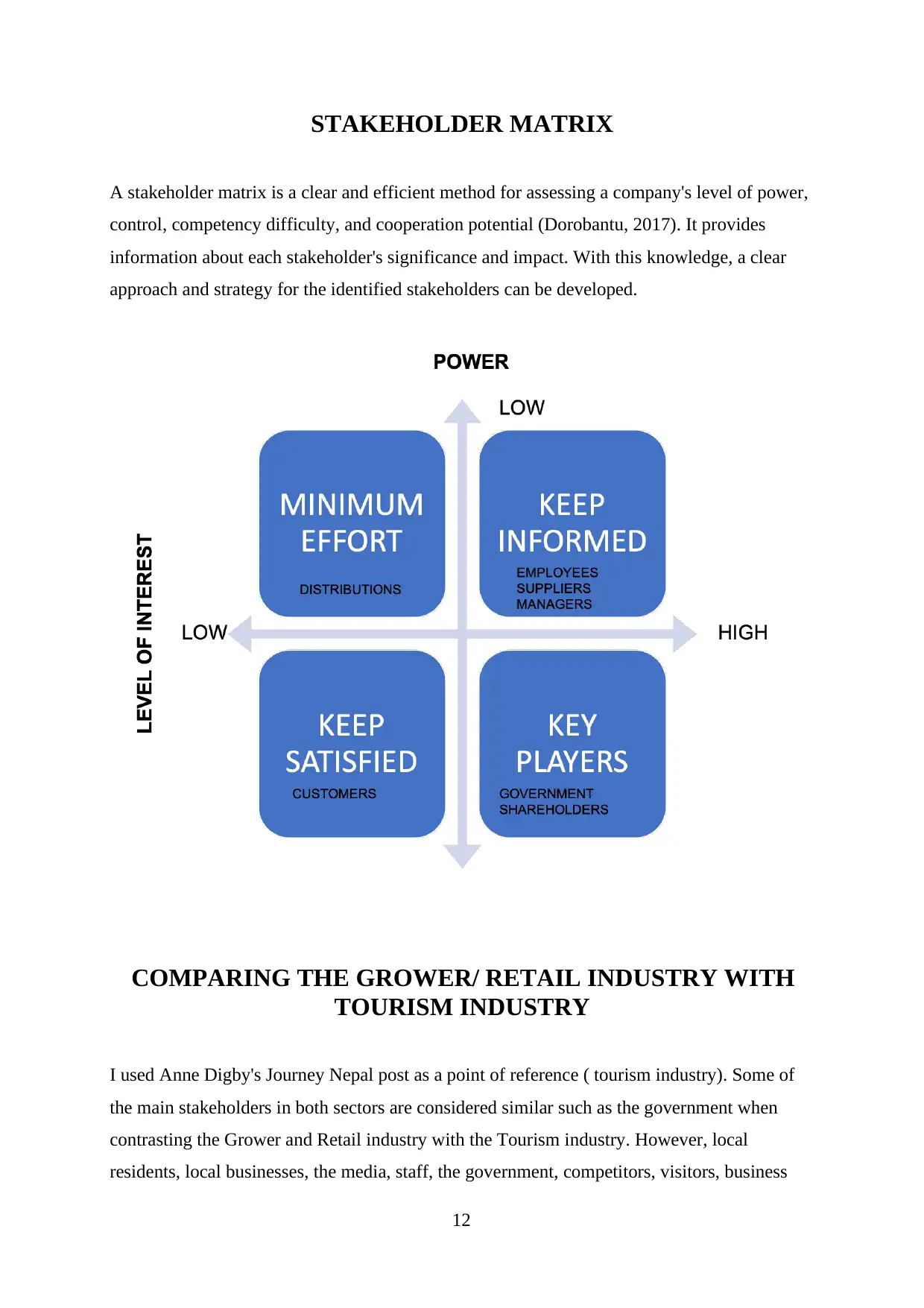
12
STAKEHOLDER MATRIX
A stakeholder matrix is a clear and efficient method for assessing a company's level of power,
control, competency difficulty, and cooperation potential (Dorobantu, 2017). It provides
information about each stakeholder's significance and impact. With this knowledge, a clear
approach and strategy for the identified stakeholders can be developed.
COMPARING THE GROWER/ RETAIL INDUSTRY WITH
TOURISM INDUSTRY
I used Anne Digby's Journey Nepal post as a point of reference ( tourism industry). Some of
the main stakeholders in both sectors are considered similar such as the government when
contrasting the Grower and Retail industry with the Tourism industry. However, local
residents, local businesses, the media, staff, the government, competitors, visitors, business
STAKEHOLDER MATRIX
A stakeholder matrix is a clear and efficient method for assessing a company's level of power,
control, competency difficulty, and cooperation potential (Dorobantu, 2017). It provides
information about each stakeholder's significance and impact. With this knowledge, a clear
approach and strategy for the identified stakeholders can be developed.
COMPARING THE GROWER/ RETAIL INDUSTRY WITH
TOURISM INDUSTRY
I used Anne Digby's Journey Nepal post as a point of reference ( tourism industry). Some of
the main stakeholders in both sectors are considered similar such as the government when
contrasting the Grower and Retail industry with the Tourism industry. However, local
residents, local businesses, the media, staff, the government, competitors, visitors, business
⊘ This is a preview!⊘
Do you want full access?
Subscribe today to unlock all pages.

Trusted by 1+ million students worldwide
1 out of 27
Related Documents
Your All-in-One AI-Powered Toolkit for Academic Success.
+13062052269
info@desklib.com
Available 24*7 on WhatsApp / Email
![[object Object]](/_next/static/media/star-bottom.7253800d.svg)
Unlock your academic potential
Copyright © 2020–2026 A2Z Services. All Rights Reserved. Developed and managed by ZUCOL.





